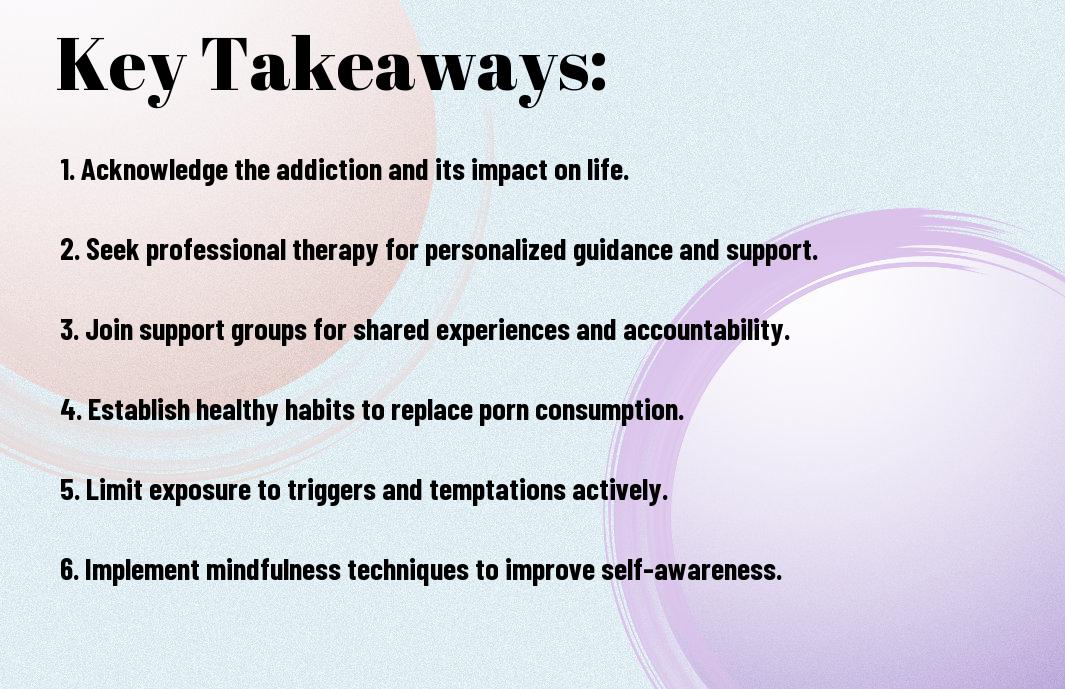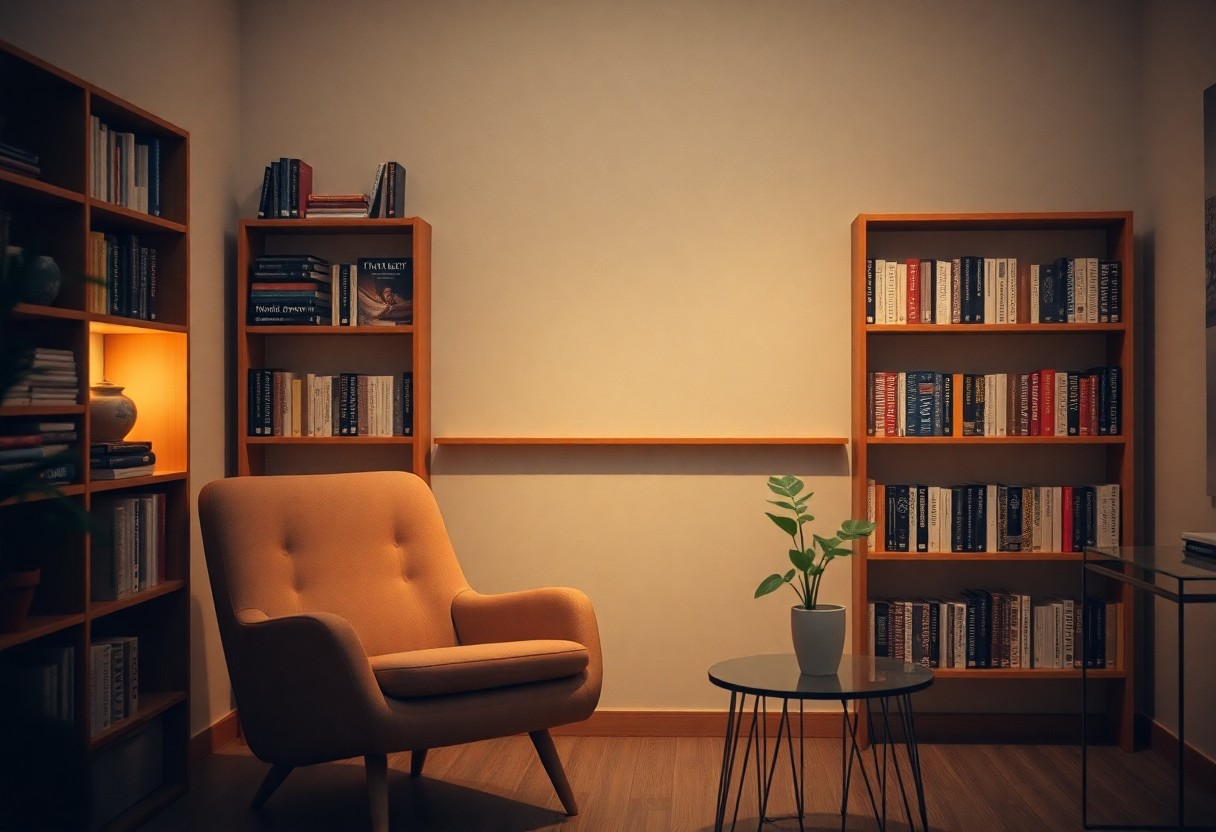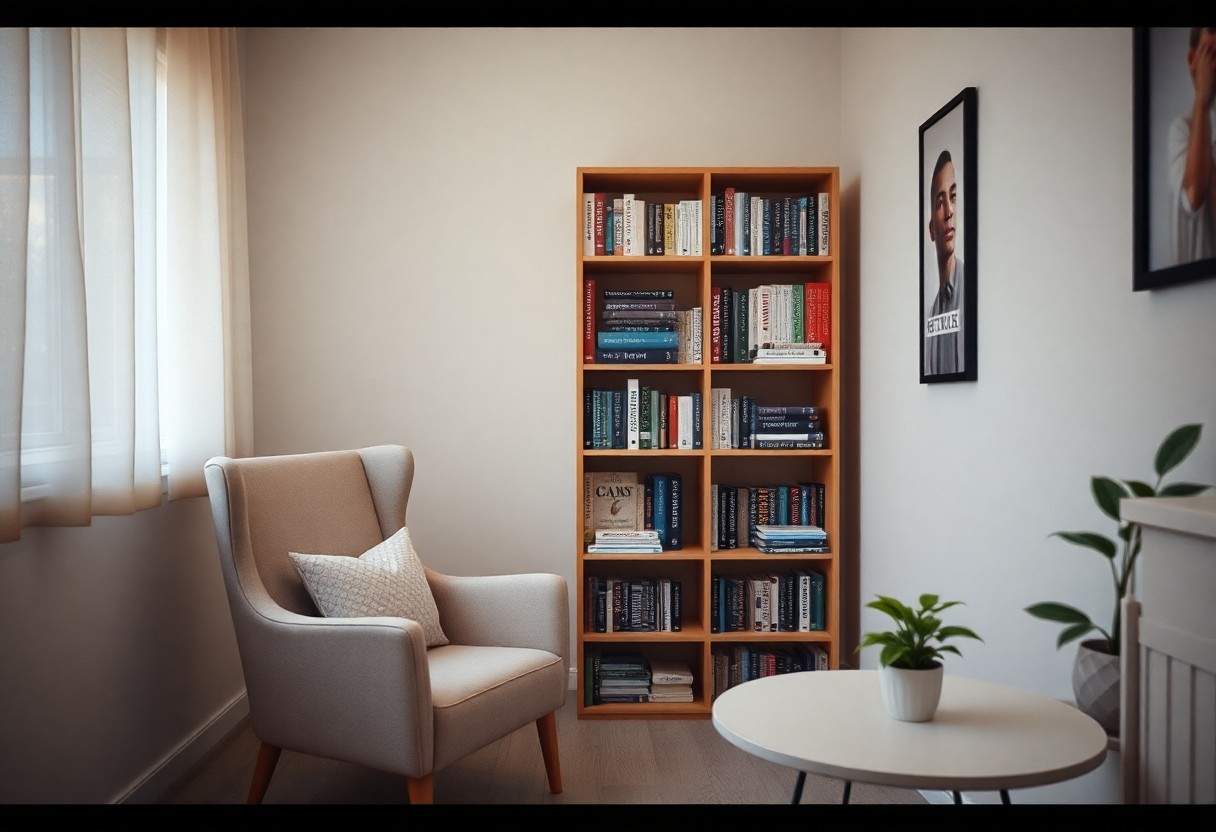Many individuals find themselves seeking help to overcome porn addiction, but knowing where to begin can be overwhelming. Your journey toward recovery involves understanding the issue, recognizing its impacts on your life, and finding appropriate resources to assist you. This blog post will guide you through the initial steps, including identifying support networks, exploring therapeutic options, and implementing practical strategies to reclaim your well-being. Together, we will explore effective methods and resources that empower you to move forward in your recovery journey.
Key Takeaways:
- Identify triggers and patterns that lead to porn use to develop strategies for avoidance.
- Seek support from therapists or counselors who specialize in addiction recovery.
- Explore support groups, both online and in-person, where you can share experiences and gain encouragement.
- Establish a daily routine that includes healthy activities to redirect focus and energy.
- Consider educational resources, such as books and articles, to better understand addiction and coping mechanisms.
- Utilize technology responsibly by implementing filters and accountability software to limit access.
- Be patient and compassionate with yourself throughout the recovery journey, acknowledging progress over perfection.


Understanding Porn Addiction
To commence on a path of healing, it is vital to grasp the elements of pornography addiction. This addiction represents a compulsive engagement with pornographic material that can interfere with your personal life, relationships, and overall mental health. Understanding the psychological and emotional impact of this behavior is the first step in effectively addressing and overcoming it.
Defining Porn Addiction
Beside the definition, it’s important to recognize that porn addiction manifests as a pattern of compulsive behavior where you may find it difficult to control or reduce your consumption of explicit content, despite negative consequences. This challenges your relationships, work duties, and daily responsibilities.
Recognizing the Signs
Addiction can often be subtle, making it difficult to identify the underlying issues. You may notice signs such as increased secrecy around your viewing habits, neglecting personal relationships, or using porn as a primary source of emotional gratification. These patterns often escalate, leading to a cycle that becomes increasingly challenging to break.
Understanding the signs can empower you to acknowledge your struggle. Pay attention to feelings of shame, guilt, or anxiety connected to your porn use, as these emotions may indicate that your relationship with pornography is unhealthy. Additionally, consider if your consumption has led to avoidance of real-life intimacy or a reliance on porn for coping with stress or loneliness. Identifying these behaviors is key to beginning your recovery journey.
The Impact of Porn Addiction
It can severely affect various aspects of your life, from mental health to relationships. Recognizing the consequences of porn addiction is imperative for finding a path toward recovery. As you investigate into the impacts, you may uncover hidden struggles that have influenced your daily life and interactions with others.
Mental Health Effects
Above all, porn addiction can lead to significant mental health challenges, including anxiety, depression, and low self-esteem. You might find yourself trapped in a cycle of guilt and shame, which can further exacerbate these feelings and create a negative feedback loop.
Relationship Consequences
Against this backdrop, your relationships may also struggle due to porn addiction. You could be experiencing trust issues, intimacy problems, or a disconnect from your partner, making it difficult to maintain healthy connections.
In fact, the detrimental effects on your relationships go beyond immediate intimacy issues. Porn addiction can lead to unrealistic expectations and a distorted view of what relationships should be, causing dissatisfaction with your partner. It may even lead to emotional withdrawal or detachment, leaving your loved ones feeling isolated and unvalued. As these issues manifest, you may notice increased arguments, decreased communication, and a growing emotional gap, all of which can spiral further into the core of your relationship.

Starting Your Recovery Journey
Once again, taking the first step towards recovery from porn addiction can feel daunting yet liberating. You may want to familiarize yourself with the Signs of Porn Addiction to better understand your habits. Acknowledging the issue allows you to begin the healing process and regain control over your life.
Acknowledgment and Acceptance
An imperative component of your recovery is acknowledging and accepting that you have a problem. This candid recognition allows you to confront the challenges associated with your addiction and paves the way for meaningful change. Embracing this truth can be your first step toward reclaiming your freedom.
Seeking Professional Help
About finding the support you need, enlisting the help of a professional can significantly enhance your recovery journey. Therapists and counselors specializing in addiction can provide personalized strategies and coping mechanisms tailored to your unique situation.
Considering a professional approach opens avenues for deeper understanding and healing. Therapists can guide you in addressing underlying issues contributing to your addiction. They often utilize a combination of cognitive-behavioral techniques and personalized therapy sessions to help you develop healthier coping strategies and rebuild your self-esteem.

Building a Support System
Unlike tackling porn addiction alone, creating a support system can significantly enhance your recovery journey. Surrounding yourself with understanding individuals can provide you with the motivation and strength needed to overcome this challenge. Whether that’s through your friends, family, or support groups, having a network of support can make a substantial difference in your healing process.
Friends and Family
For many, confiding in friends and family can be a powerful step toward recovery. These trusted individuals can offer emotional support and encouragement as you navigate the challenges of overcoming addiction. By sharing your struggles with them, you create a sense of accountability, which can help you stay committed to your recovery goals.
Support Groups and Communities
The journey to recovery is often made easier by connecting with others facing similar challenges. Support groups and communities provide a safe space where you can share your experiences, learn from others, and receive encouragement. Engaging with individuals who understand your struggle can foster a sense of belonging, motivating you to stay on track.
Indeed, joining a support group can offer a wealth of resources and coping strategies that are tailored to your specific needs. These groups often host regular meetings, both in-person and online, where members can share their stories and progress. Connecting with others who face similar struggles not only helps you feel less isolated but also reinforces your commitment to recovery by creating a network of individuals dedicated to overcoming porn addiction together.
Implementing Coping Strategies
After recognizing your struggle with porn addiction, it’s crucial to implement effective coping strategies that help you maintain your recovery. These strategies provide you with tools to manage cravings, reduce temptation, and promote healthier habits. By establishing a structured approach to dealing with your urges, you’ll be better equipped to prevent relapse and maintain control over your choices.
Mindfulness and Meditation
Among the most effective coping strategies are mindfulness and meditation practices. These techniques allow you to cultivate awareness of your thoughts and feelings, helping you to manage cravings without acting on them. By taking time each day to focus on your breath or engage in guided meditation, you can create mental space that fosters clarity and self-control.
Setting Boundaries with Technology
Above all, setting boundaries with technology is crucial for your recovery journey. This may involve limiting your access to certain websites or utilizing apps designed to block explicit content. By creating a safe digital environment, you reduce the likelihood of encountering triggers that may derail your progress.
In addition to blocking harmful content, consider establishing specific times when you use technology. Schedule tech-free activities, such as reading, exercising, or spending time with loved ones, to foster a balanced lifestyle. By conscientiously managing your digital interactions, you can create healthier habits that support your recovery efforts and promote overall well-being.
Maintaining Long-Term Recovery
Keep in mind that maintaining long-term recovery from porn addiction requires ongoing effort and commitment. It’s important to create a support system and stay vigilant against triggers that can lead you back to old habits. Regularly assessing your progress and adjusting your strategies can help ensure that your recovery journey remains successful.
Developing Healthy Habits
Above all, cultivating healthy habits is vital for sustaining your recovery. Engaging in regular physical activity, practicing mindfulness, and nurturing positive relationships can help shift your focus away from addiction. These healthy routines will replace negative behaviors and support your overall well-being as you navigate your recovery.
Continuous Self-Reflection
Against the backdrop of your recovery journey, continuous self-reflection is important. Evaluating your thoughts, feelings, and behaviors not only helps you identify triggers but also allows you to recognize patterns that may hinder your progress. By regularly checking in with yourself, you can make informed decisions that align with your recovery goals.
With consistent self-reflection, you create an opportunity for growth and change. Journaling can be an effective tool for this process, as it allows you to express your thoughts and emotions while tracking your progress. Consider setting aside time each week to reflect on your experiences, challenges, and successes. This practice will enhance your self-awareness and keep you aligned with your recovery objectives, empowering you to make proactive choices for your future.
Final Words
Following this, you can start your recovery from porn addiction by seeking support from trusted friends or family, or exploring professionals who specialize in addiction therapy. Consider joining support groups where you can share your experiences and learn from others. Additionally, establishing personal goals and engaging in fulfilling activities can help redirect your focus. Utilize resources such as self-help books and online courses to deepen your understanding and commitment to change. Your journey to recovery is personal, and every step you take is a step toward a healthier life.
FAQ
Q: Where can I find initial support for porn addiction recovery?
A: Starting your recovery journey can be daunting, but there are various resources available. Consider seeking support from local therapy centers that specialize in addiction. Alternatively, online counseling and support groups can provide immediate assistance and connect you with others facing similar struggles.
Q: Are there online communities that help with porn addiction recovery?
A: Yes, there are several online platforms dedicated to those seeking recovery from porn addiction. Websites like NoFap, YourBrainOnPorn, and various forums on Reddit offer community support, personal stories, and strategies to help individuals work towards overcoming their addiction.
Q: Should I consider attending a support group for porn addiction?
A: Attending a support group can be beneficial. Groups such as Sex Addicts Anonymous (SAA) or Porn Addicts Anonymous (PAA) provide a safe environment to share experiences and learn from others. These groups can foster accountability and offer insights from individuals who have faced similar challenges.
Q: How can therapy help in recovery from porn addiction?
A: Therapy can be an effective way to address the underlying issues contributing to your addiction. A trained therapist can help you identify triggers, develop coping strategies, and work through any emotional or psychological aspects related to your behavior. Cognitive Behavioral Therapy (CBT) is often recommended for treating such addictions.
Q: What resources are available for family and friends of someone with porn addiction?
A: It’s important for loved ones to have their own support systems as well. Websites like the National Council on Sexual Addiction and Compulsivity offer resources for families. Support groups specifically for spouses and partners can also provide guidance, helping them understand the addiction and how to effectively support their loved one.
Q: Can self-help strategies be effective in recovering from porn addiction?
A: Yes, many individuals find self-help strategies valuable. Techniques like keeping a journal, setting clear goals, and utilizing apps designed to limit screen time can help you create healthier habits. Engaging in alternative activities, such as exercise or hobbies, can also serve as productive outlets during recovery.
Q: What role does education about porn addiction play in recovery?
A: Educating yourself about the effects of porn on the brain and behavior is an important step in recovery. Understanding the science behind addiction can motivate you to change your habits. Numerous books, articles, and videos are available that explain the impact of porn on mental health and relationships, reinforcing the reasons for seeking recovery.
